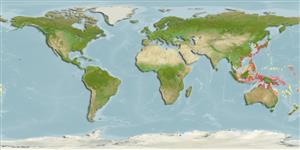Environment: milieu / climate zone / depth range / distribution range
Ekologi
marina; djupintervall 3 - 6 m (Ref. 48637). Tropical
Northwest Pacific: southern Japan to the East China Sea and northern South China Sea (Ref. 12068).
Size / Vikt / Age
Maturity: Lm ? range ? - ? cm
Max length : 50.0 cm TL hane/ej könsbestämd; (Ref. 56557)
Found near shore on mud, sandy mud or rock bottoms (Ref. 11230, 48637). Usually forms large schools (Ref. 48637). Feeds on fishes.
Life cycle and mating behavior
Könsmognad | Reproduktion | Lek | Ägg | Fecundity | Larver
Masuda, H. and G.R. Allen, 1993. Meeresfische der Welt - Groß-Indopazifische Region. Tetra Verlag, Herrenteich, Melle. 528 p. (Ref. 9137)
IUCN Red List Status (Ref. 130435)
Threat to humans
Harmless
Human uses
Fiskeri: kommersiellt viktig
Ytterligare information
referenserVattenbrukVattenbruksprofilAvelslinjerGenetikElectrophoresesÄrftlighetSjukdomarBehandlingNutrientsMass conversion
MedarbetareBilderStamps, Coins Misc.LjudCiguateraHastighetSimsättGälytaOtolithsHjärnstorlekSyn
Verktyg
Special reports
Download XML
Internet-källor
Estimates based on models
Preferred temperature (Ref.
123201): 21.9 - 29.3, mean 28.4 °C (based on 1621 cells).
Phylogenetic diversity index (Ref.
82804): PD
50 = 0.5000 [Uniqueness, from 0.5 = low to 2.0 = high].
Bayesian length-weight: a=0.00661 (0.00413 - 0.01056), b=2.94 (2.81 - 3.07), in cm total length, based on LWR estimates for this species & Genus-body shape (Ref.
93245).
Trofisk nivå (Ref.
69278): 4.5 ±0.8 se; based on diet studies.
Resiliens (Ref.
120179): Mellan, lägsta populationsfördubblingstid 1,4-4,4 år (Preliminary K or Fecundity.).
Fishing Vulnerability (Ref.
59153): Moderate vulnerability (40 of 100).
Nutrients (Ref.
124155): Calcium = 73.1 [31.4, 239.5] mg/100g; Iron = 0.765 [0.340, 1.793] mg/100g; Protein = 19.9 [17.7, 21.7] %; Omega3 = 0.132 [0.052, 0.347] g/100g; Selenium = 24 [8, 73] μg/100g; VitaminA = 17.5 [2.9, 103.8] μg/100g; Zinc = 0.603 [0.341, 1.100] mg/100g (wet weight);
